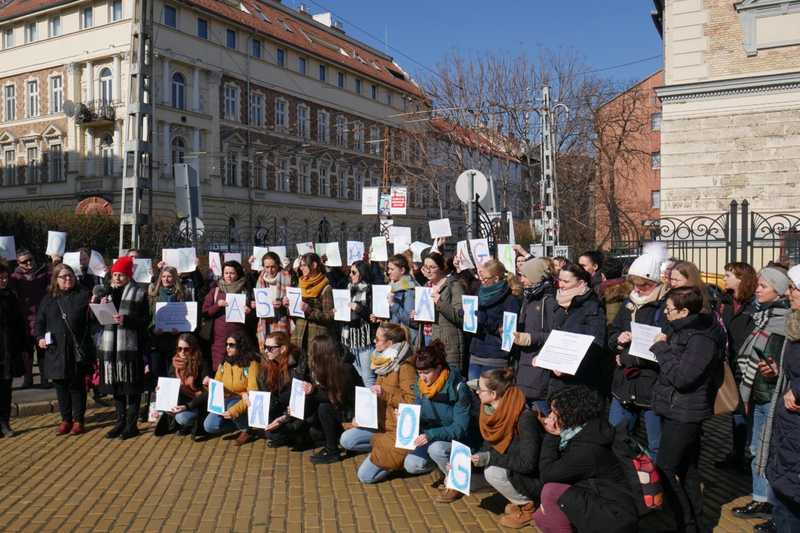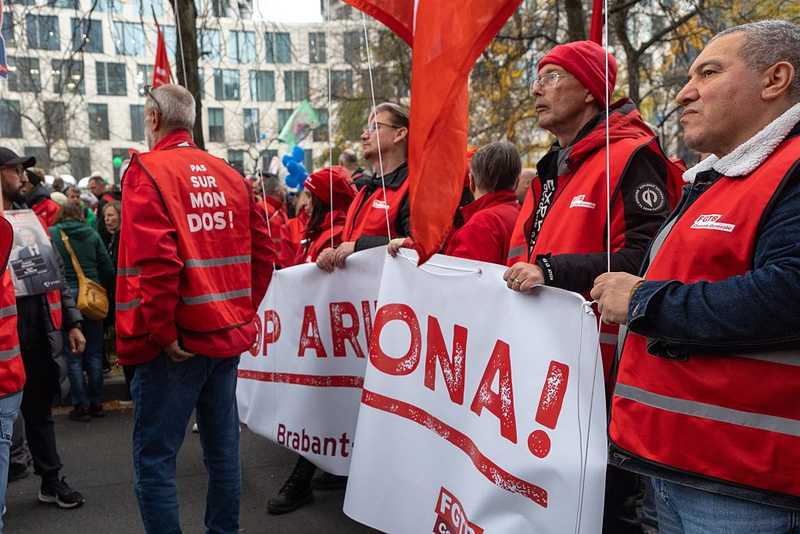
Editorial note: This article by Wire partner Mérce is a report on Hungarian teachers’ warning strike which took place on 31 January. The warning strike was called after an initial strike in October 2021 and the resulting negotiations did little to move closer to an agreement and it became clear the government was not taking demands seriously. Since then, the government has gone on the offensive, and has tried to turn public opinion against unions and teachers and, unsuccessfully, make participation in the March 16 strike illegal. The teachers’ unions on the other hand are confident turnout and support from parents and society as a whole will be even higher and they will be able to maintain an indefinite strike until demands are met. Whatever happens, it is clear that with elections looming on the horizon, the stakes couldn’t be higher.
Nothing could be achieved without a walkout
January’s two-hour warning strike was preceded by a months-long series of strike talks between a delegation from the Teachers’ Trade Union (PSZ) and the Democratic Trade Union of Teachers (PDSZ) on the one hand and the representative of the Ministry of Human Resources, Deputy State Secretary László Kisfaludy on the other. After the talks, the unions saw no other way to get their demands accepted than to call for a warning strike.
- The projection basis for the teachers’ basic pay base should be the current minimum wage – and applied retroactively from 1 September 2021. The salary scale is still calculated based on the 2014 minimum wage.
- The guaranteed pay for non-teaching staff in education should also be increased retroactively from September.
- Teachers’ working time dedicated to education and teaching should not exceed 22 hours per week.
- Pedagogical and special educational assistants – who currently spend 40 hours per week with their duties – should be employed for a maximum of 35 hours and should be granted 5 hours a week outside the institution for regeneration and preparation, just like teachers.
In contrast, the Ministry of Human Resources presented the teachers with humiliating offers during the negotiations and clearly played for time. The negotiator Kisfaludy had no real decision-making power, and weeks passed between rounds. The government was presumably hoping to wear teachers down and expected that there would be no serious support for the demands, just like in previous years.
The stakes of the warning strike were therefore huge for the teachers’ struggle, as it was then that teachers found out how much strength and support they could muster against the power that had been ignoring them. Accordingly, the government sought to cripple the unions wherever it could.
In addition to playing for time, the authorities launched an all-out offensive, trying to discredit the unions and their demands among teachers and the whole society, claiming that they were part of the opposition campaign, sometimes sinking to the level of obvious and utter nonsense. On the other hand, they threatened teachers who supported and participated in the strike, claiming that if they failed to provide “just sufficient service” during the strike – the level of which had not been agreed upon because of the government’s dedicated efforts – they would be breaking the law and the strike would be declared illegal anyway. They communicated that participants would face retaliation – and in many cases, they did not shy away from disinformation and other indecent means.
At the same time, the teachers had a lot of support – from the Trade Union Co-operation Forum, which organized a motorcade for supporters, to the mayors of Budapest, the “ironing board teacher” László Vezsenyi, parents, trade unions and various other groups.
Equally important was the court’s ruling on the Friday prior to the strike that the teachers’ warning strike was legal.
This gave trade unions a strong trump card, making it easier for them to convince colleagues who, fearing possible reprisals, would not have participated in the walkout and the protest. The blatantly hostile statements of the operator and the government are likely to have silenced a high number of teachers nonetheless, who did not dare to speak out for fear of their livelihood.
Achievements and importance of January’s strike
Although the two-hour warning strike in itself did not shake society or the government, the trade unions consider it a success, and rightly so. Over one-fifth of teachers took part in the strike – something that has not happened since 2016.
Despite the retaliation envisaged by the operator and the government – which have since been implemented – countless teachers from many educational institutions have committed themselves with their faces and photos to participate in the strike, both in Budapest and the countryside.
By saying that if the government had recognized the legality of the strike, even more teachers would have participated, State Secretary for Public Education Zoltán Maruzsa effectively praised – presumably against his own will – the courageous stand of the more than 20,000 striking teachers.
Unlike on previous occasions, the unions have been united and energetic since the start of negotiations with the government. The broad social support mentioned above is just as important. While this was most visible in the unions’ supporting motorcade, teachers across the country – in small towns, cities as well as the capital – also received extensive support from parents who kept their children at home for the first two hours.
In other words, the government failed to antagonize the different groups. The disappointing situation of teachers had been successfully communicated to society, and thus a large number of people took part in the protest, showing solidarity with the undoubtedly essential, yet morally and financially under-appreciated, profession.
This gave teachers and unions a further boost and confidence for organizing the indefinite strike announced for March 16. However, the trade unions will have to overcome several obstacles to the indefinite strike.
The path ahead
According to the teachers, the government will continue to play for time – presumably using further threats and dubious rights-based blackmail, as well as a hostile media campaign.
However, Erzsébet Nagy, member of the national executive committee of PDSZ thinks this can backfire:
“Lots of people are in favor of hanging in there and keeping going because the situation is simply appalling. The system must change, it can’t stay the way it is. It is absurd that the government is making such a big deal out of an event that is perfectly normal in a democracy: a warning strike, with childcare provided on the side. It strikes everyone as something quite incredible and surreal. It also shows the state of democracy in Hungary today since this can happen under government control”– the trade union leader told Mérce.
The arrogant communication and cynical behavior of the government are unlikely to antagonize those groups of society that already support teachers. Given the proverbially poor conditions of education workers, the incitement against them may even win them further support.
What remains to be seen is the extent to which parents will be able to support a potential indefinite strike, taking into account practical considerations. They may well be able to look after their children for two hours when there is no schooling. But if schools are closed for days or even weeks, they may not be able or willing to provide supervision. Schools may nonetheless overcome this difficulty by providing childcare during strikes.
An even tougher question is whether teachers can financially afford a strike of indefinite length. It is precisely because of the humiliatingly low salaries that teachers are in a financially vulnerable position – and the government constantly reminds them that they are not paid during the strike.
Most people can bear losing two hours’ wage – but losing days’ or weeks’ wage is an entirely different matter.
In the best case, the union organizing the strike has a strike fund that can cover the living costs of the participants in the event of a work stoppage (further traditional means include strike barracks providing services, food, etc. for striking workers). However, teachers are poorly organized, the unionization rate being barely above 10%. Due to their low wages, the collected dues are also moderate – so strike funds are presumably insufficient for a longer period.
Which does not mean, however, that it is beyond their capacity to organize an indefinite strike.
Over and above organizing disgruntled teachers – and unionizing them – unions also need to fill the strike fund now, and harnessing social solidarity is the way to go. They need to raise awareness about their need for financial support among those who support their cause, otherwise the government can relax, saying “let them strike; soon enough they will pick up work again.”
But if they can create the conditions for a prolonged strike for many, it would have spectacular consequences: teachers would get a chance to force their demands and set an example to other professions. Weeks before the elections, a significant, nationwide protest is the last thing the government needs.
Kiss Soma Ábrahám is a sociologist and journalist at the Hungarian news and opinion portal Mérce.






